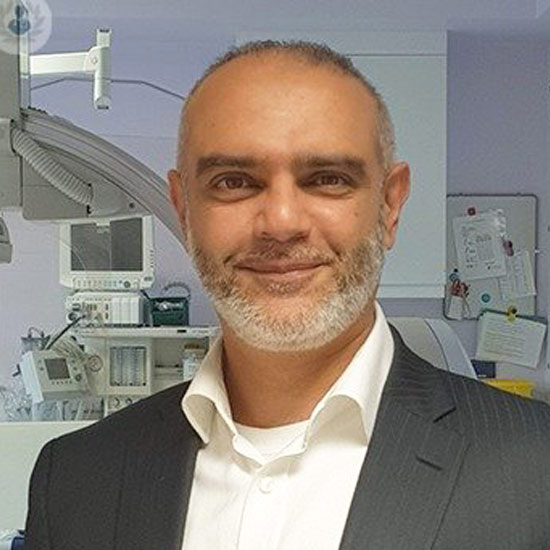London Medical Cardiology
Angina Management & Treatment
London Medical’s Cardiology Clinic provides the most up-to-date investigative cardiac procedures for patients with heart problems – and some of the UK’s most renowned cardiologists hold clinics here for all aspects of heart disease.
Angina
Angina can be a precursory sign that something isn’t quite right with your heart health. Some types of angina are more severe than others, that’s why it’s so important to identify which specific type you have, to ensure you receive the right treatment.
It’s not normally life-threatening, but it will often require treatment to help you maintain a healthy lifestyle.
Understanding more about managing angina effectively can allow you to take better control of your health and wellbeing while living with the condition.
Understanding angina symptoms
The most common symptom you will experience with angina is chest pain, most commonly upon exercise, but other, less typical symptoms can develop as well. These can include:
- Breathlessness
- Nausea
- Pain similar to indigestion
- Feeling more tired than usual
Feeling chest pain doesn’t always mean it is angina, but it could be if it:
- The chest feels tight, heavy, or dull
- Spreads to other areas of your body, typically to the left arm
- Happens after you exert yourself
- Stops after resting for a few minutes
Exploring the causes of angina
There are several types of angina, which can each be caused by a variety of factors. The four types main of angina include:
- Stable angina (occurs primarily upon exercise)
- Unstable angina (occurs suddenly, more more often and/or at rest. ; Mmay be a sign of a heart attack)
- Microvascular angina
- Variant angina (mostly cause by a spasm of a coronary artery; occurs at rest)
The main cause of angina is atherosclerosis — a process which narrows your arteries through the build-up of cholesterol-rich plaque, making it difficult for enough oxygen-rich blood to get to the heart muscle.
This is typically caused by:
- Eating an unhealthy diet
- Lack of exercise
- Smoking
- High cholesterol levels in blood
- High blood pressure
- Diabetes
- Ageing
- Family history of the condition
All of these factors can put you at a higher risk of developing angina or other heart-related complications, such as a heart attack.
Angina can also be caused by other heart conditions that impact your arteries and heart.
Diagnosing angina and evaluating its severity
If you believe that you may have angina, the first thing you need to do is speak with a cardiologist and you can do just that with London Medical.
Call us on +44 (0)800 0483 330 today and we will be able to book you an appointment with our highly qualified cardiologists. If you let our team know that you are experiencing chest pain, we will do our best to get you an early appointment.
Our cardiologists are experts in heart health and will guide you on what your next steps should be. At your appointment, they will also ask you questions about your symptoms, when they first occurred, your lifestyle and your family history.
They might also measure your blood pressure, check your weight and body mass index (BMI) and suggest a blood test to check your cholesterol and blood sugar. In some cases, you might also be referred to the hospital for further testing if they suspect you have angina.
In most cases, you will need multiple tests before you receive an angina diagnosis.
Testing for angina at the hospital involves:
- A careful medical history by a cardiologist
- An electrocardiogram (ECG) to assess your heart’s rhythm
- An exercise ECG to assess your heart’s rhythm while you are exercising
- A computer tomography of the heart to see any suspicion of a narrowing of your arteries
- If a strong suspicion is based on the prior examinations, coronary angiography to highlight your heart and blood vessels using an injected dye might be required
- Further blood tests (e.g. complete lipid status, longterm sugar, C-reactive protein among others)
Once the tests are complete, your results will be analysed for characteristics of angina.
Types of angina and their characteristics
The four main types of angina are all slightly different.
Stable angina is the most common and normally causes chest pain because of a specific trigger, such as walking up the stairs, exercising and stress, particularly after a meal or in cold air. It vanishes at rest and can be effectively managed with medicines if it is mild in nature, otherwise with stenting or bypass surgery.
Unstable angina is more severe and may occur at minimal exercise or even at rest. If it persists for up to 20 minutes, a heart attack should be suspected and A&E visited.
Unlike other types of angina, microvascular angina isn't caused by blockages to the heart’s large blood vessels, but rather by a specific disease of the small blood vessels, making them constrict and as such impairing their ability to dilate upon exercise, and reducing the amount of oxygen-rich blood that’s able to reach the heart muscle.
Variant angina occurs when your coronary arteries spontaneously become heavily constricted thereby transiently restricting the blood flow to the heart muscle. Having coronary heart disease can make this condition worse. Variant angina can also develop alongside microvascular angina. It is usually managed by medication (e.g. Calciumantagonists).
When to seek urgent medical care
When you experience chest pain, it can be difficult to know whether to call for urgent medical care or not.
Always call 999 if you feel chest pain and:
- You haven’t been diagnosed with angina
- This is your first angina attack
- You do not have your angina medication with you
- The chest pain is happening at rest
- The chest pain is worse than in previous attacks
- The chest pain does not stop after up to 20 minutes
Treatment options for angina
Some treatments can help stop angina attacks, while others reduce your risk of heart attacks and premature death.
The type of treatment you receive will depend on the type of angina that you have. If you have stable angina, you will usually be prescribed glyceryl trinitrate (GTN) to stop an acute attack. This is a spray that you apply under your tongue when you feel an attack coming on. The long term treatment involves long acting nitrates, beta blockers to reduce your heart rate and calcium antagonist to dilate your coronary arteries. To prevent a heart attack, usually Aspirin and a cholesterol-lowering medication is prescribed. If you’re unable to take these medications, you might be prescribed something else instead.
If medications aren’t helping with your angina, surgery or a catheter-based intervention might be your next option. Typical surgical procedures include:
- Coronary balloon angioplasty and stent insertion to widen a narrowed segment of your artery.
- Coronary artery bypass graft (CABG) – this involves taking a section of a blood vessel from another part of your body and using it to reroute blood near the blocked or narrowed arteries. This is commonly used for more advanced stages of the disease
Preventing angina: risk factors and strategies
You might not always be able to completely prevent angina, but some risk factors can make it more likely. These include:
- Smoking
- High blood pressure
- High cholesterol levels
- Obesity
- Diabetes
- Stress
- Family history of heart disease
- Ageing
Angina itself is not a hereditary condition, but if you have a family history of the condition, you could have a higher risk of developing a heart condition that causes angina or a heart attack.
Living with angina: tips for managing the condition
When managed in the right way, using the correct medication and maintaining a healthy lifestyle, most people with angina can carry on living their life as usual.
Being active is important when living with angina. Make sure you build up your exercise tolerance slowly and always take regular breaks. Also, keep any medication with you and, if necessary, take it before exercising.
When you’re out of the house, always have your angina medication with you just in case you need it. Life with angina can be tough sometimes, so always reach out for help if you need it.
Get in touch with London Medical
If you think you might have angina or want some more support in managing your condition, get in touch with our caring team at London Medical.
Having angina doesn’t mean you need to stop living your life to the fullest. From testing to diagnosis to living with the condition, we will be with you for every step of the way.
Sources:
- https://www.nhs.uk/conditions/angina/
- https://www.bhf.org.uk/informationsupport/heart-matters-magazine/medical/ask-the-experts/microvascular-angina#:~:text=Microvascular%20angina%20refers%20to%20disease,who%20have%20clear%20heart%20arteries.
- https://www.bhf.org.uk/informationsupport/heart-matters-magazine/medical/all-about-microvascular-angina
- https://www.sja.org.uk/get-advice/first-aid-advice/heart-conditions/angina-attack/#:~:text=If%20the%20casualty%20is%20not,to%20seek%20urgent%20medical%20aid.
- https://www.nhs.uk/conditions/angina/treatment/
- https://www.bhf.org.uk/informationsupport/conditions/angina
Our Consultants
Dr George Amin-Youssef
Consultant cardiologist who deals with adults and specialises in heart failure, including advanced heart failure, working in one of the largest heart failure units in the UK.
Professor Carlo Di Mario
Specialist in Interventional cardiology – the use of catheters and other devices to restore blood flow to the heart without major surgery.
Dr Claire Chalmers-Watson
Dr Chalmers-Watson is an experienced General Practitioner with over two decades of experience in primary care and a profound expertise in managing a broad spectrum of health conditions.
Dr Shouvik Haldar
Consultant Cardiologist and Electrophysiologist at the Royal Brompton and Harefield Hospitals with a specialist interest in the management of patients with abnormal heart rhythms.
Dr Riyaz Kaba
Consultant cardiologist and electrophysiologist, specialising in arrhythmias, ablations, and pacemakers.
Professor Thomas F. Lüscher
Consultant in cardiology, interested in interventional cardiology, rhythmology, echocardiography, heart failure, acute cardiac care, and sports cardiology.
Dr Khaled Mallek
An esteemed consultant interventional and general cardiologist, specialising in complex coronary interventions and chronic total occlusions.
Professor Kausik Ray
Consultant preventative cardiologist, specialising in diabetes, lipids, glucose, hypertension and cardiometabolic traits.
Dr Neil Srinivasan
Consultant cardiologist, specialising in the management of heart rhythm problems.
Dr Aphrodite Tzifa
A fully trained Paediatric and Adult Congenital Heart Disease Cardiologist with more than 23 years’ experience in the field.
Our Cardiology specialties
We offer care across a broad range of cardiology specialties. We have some of the top specialists in every aspect of cardiac care. Our entire team is dedicated to working together to consider the results of your investigations, your health and your lifestyle before tailoring a treatment plan to your individual needs.
Our Locations
London Medical is located in the Harley Street medical area. Together with top experts across a range of multi-disciplinary fields, we offer the finest facilities for your care, all under one roof.
Monday to Friday 8.30am to 8pm
Monday to Friday 8.30am to 8pm
Monday to Friday 8.30am to 8pm
Speak to a member of our team
Contact the appointments team
If you have any questions or want to book an appointment, please speak to our team on +44 (0)800 0483 330.
If you wish to book online, for private GP appointments, please use our GP appointment form.
Or, make an enquiry online using this form and one of our team will be in touch. Please note, all the information collected is required as part of our registration process. By using this form you agree with the storage and handling of your data by our team. You don't need a referral from your GP to make an appointment with us.
Heart Health News
Find out the latest news, thinking and insights from our experts. Our Heart Health News is your go-to source of trusted advice and knowledge on all matters of the heart.













